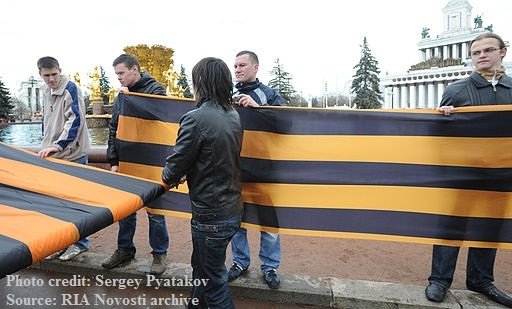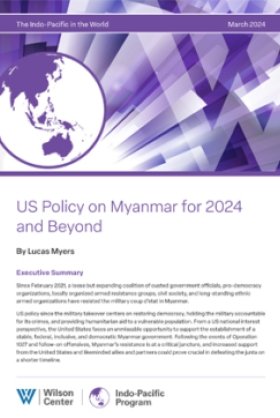Russia’s new “Georgievskaya” ideology
Former History and Public Policy intern Volodymyr Valkov recently co-published an article in Visegrad Insight discussing the foundation and development of Russia’s “new ideology,” tracing its importance in the conflict with Ukraine. Valkov argues that keeping Ukraine divided and unstable comes as part and parcel of Russia’s plan for domination over Europe, and more specifically Eastern Europe.

Former History and Public Policy intern Volodymyr Valkov recently co-published an article in Visegrad Insight discussing the foundation and development of Russia’s “new ideology,” tracing its importance in the conflict with Ukraine. Valkov argues that keeping Ukraine divided and unstable comes as part and parcel of Russia’s plan for domination over Europe, and more specifically Eastern Europe.
The article titled “Russia’s new “Georgievskaya” ideology” outlines key elements in Russia’s new ideology:
· The “Nashi” youth movement, created by the Russian Presidential Administration in 2005, aimed at radicalizing youth in an attempt to counter pro-Western influences in Russia.
· The St. George’s Ribbon, invented in 2005, symbolyzed Russia’s glory in an attempt to romanticize the Victory Day holiday (Den Pobedyi) , and later became associated with the Ukrainian Front – the main opposition movement to the Euro-Maidan protests.
· The pervasive influence of the state controlled media, and more specifically of Russia Today also established in 2005, has served to create an impression of Russia as a world leading power.
· Russian exceptionalism as exemplified in the concept of sovereign democracy – a new form of political order akin to Russia and somehow organic, or inherent in its political past.
· The concept of Neo-Eurasianism, or the idea of Russia’s unique place as the “in-between” Europe and Asia, placed emphasis on geopolitics and strategy, but also on exceptionalism in a cultural sense as well.
· Ruskii Mir doctrine – manifested through soft power and cultural diplomacy, including the use of the Russian Orthodox Church as a vehicle for increasing Russian influence in neighboring Orthodox countries
In their conclusion co-authors Valkov and Urcosta argue that the Russian expansionist ideology remains flawed on many levels: it is not authentic, not geared towards the common good of the people, and is ultimately and expression of misconstrued notion of greatness where aggression and non-conformism to international norms and rules are perceived as strength.
“The source of the crisis in Ukraine is a systematic and well-planned program by Moscow to undermine the Ukrainian state. Russia is using Ukraine as a proxy to wage its civilization war against Western Europe and the United States. The Crimean crisis has so far demonstrated that Europe and the United States have not been able to respond adequately to Russia’s actions. This will likely embolden Russian to orchestrate further escalation of violence and instability in Ukraine. Russian ideology, which we analyze in this article, is designed for “greatness” and has a big appetite. If Ukraine falls, Russia will not stop there. After absorbing Ukraine (should this happen), Russia will likely seek to restore its influence in the former Warsaw Pact area, including the V4 states.”
Ridvan Bari Urcosta, human rights activist, political scientist, and member of the Crimean Tatars International NGO “Bizim Qirim” in Simferopol, Crimea, Ukraine.
Volodymyr Valkov, human rights activist, researcher, and political analyst, as well as a project manager at the American Jewish Ukrainian Bureau for Human Rights “UCSJ” in Lviv, Ukraine
The full text of the article Russia’s new “Georgievskaya” ideology is available through the site of Visegrad Insight.
Contributors

Global Europe Program
The Global Europe Program is focused on Europe’s capabilities, and how it engages on critical global issues. We investigate European approaches to critical global issues. We examine Europe’s relations with Russia and Eurasia, China and the Indo-Pacific, the Middle East and Africa. Our initiatives include “Ukraine in Europe” – an examination of what it will take to make Ukraine’s European future a reality. But we also examine the role of NATO, the European Union and the OSCE, Europe’s energy security, transatlantic trade disputes, and challenges to democracy. The Global Europe Program’s staff, scholars-in-residence, and Global Fellows participate in seminars, policy study groups, and international conferences to provide analytical recommendations to policy makers and the media. Read more

History and Public Policy Program
The History and Public Policy Program makes public the primary source record of 20th and 21st century international history from repositories around the world, facilitates scholarship based on those records, and uses these materials to provide context for classroom, public, and policy debates on global affairs. Read more









